Hyundai Motor Bundle
Who Really Calls the Shots at Hyundai Motor Company?
Unraveling the ownership of a global powerhouse like Hyundai Motor Company is key to understanding its strategic moves and future trajectory. From its humble beginnings to its current status as a world-leading automaker, Hyundai's journey is a story of ambition and strategic ownership. Understanding the Hyundai Motor SWOT Analysis is crucial. This deep dive into Hyundai's ownership structure reveals the forces that shape its decisions.
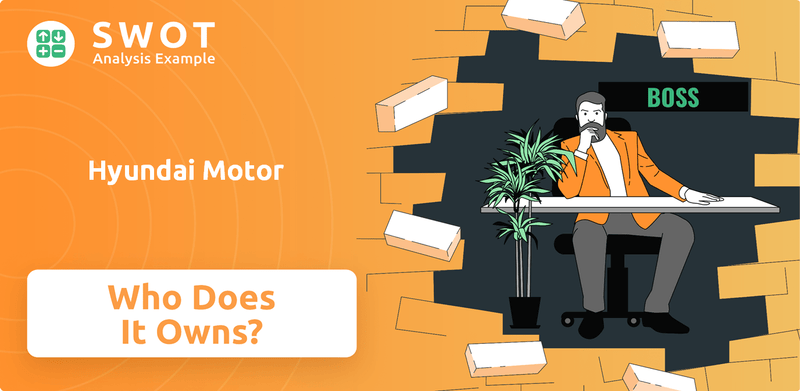
This article will meticulously dissect the Hyundai Motor Company ownership structure. We'll explore the evolution from the founder's initial vision to the complex web of stakeholders today. Understanding who owns Hyundai and the dynamics of the Hyundai Group and Hyundai Motor Group is essential for any investor or industry observer. We'll provide an in-depth analysis of the Hyundai parent company and its impact on the company's direction, corporate governance, and overall success, including details on the Hyundai Motor Company owner details and Hyundai Motor Company major stakeholders.
Who Founded Hyundai Motor?
The genesis of Hyundai Motor Company traces back to 1967, with Chung Ju-yung at the helm as its founder. While the precise initial equity distribution isn't publicly available, the ownership structure was fundamentally family-controlled from the outset. This approach was typical of South Korean chaebols, where founding families retain significant influence.
Chung Ju-yung's entrepreneurial journey began with Hyundai Engineering and Construction in 1947, laying the groundwork for his expansion into the automotive sector. Early ownership was concentrated within the Chung family and closely-held entities. This structure was essential for the swift, centralized decision-making that characterized the company's early stages.
The founding team's vision for Hyundai Motor Company was deeply rooted in self-sufficiency and contributing to Korea's economic development. This vision was reflected in the concentrated ownership, which allowed for efficient management and strategic direction during the company's formative years. The initial focus was on establishing a vertically integrated industrial powerhouse.
Chung Ju-yung founded Hyundai Motor Company in 1967.
The Chung family established a family-controlled structure.
The vision was to create a vertically integrated industrial powerhouse.
Concentrated ownership allowed for swift, centralized decision-making.
Hyundai aimed to contribute to Korea's economic development.
The initial focus was on self-sufficiency.
The early ownership of Hyundai Motor Company was primarily consolidated within the Chung family and closely held entities, a common practice among South Korean chaebols. This structure enabled efficient management and strategic direction during the company's formative years. The company's initial focus was on self-sufficiency and contributing to Korea's economic development, which was reflected in the concentrated ownership. For more insights into the broader strategic goals of the company, you can read about the Growth Strategy of Hyundai Motor.
The early ownership structure of Hyundai Motor Company was centered around the Chung family, reflecting a typical chaebol model.
- Hyundai ownership was initially concentrated within the Chung family.
- The structure facilitated swift decision-making.
- The vision included contributing to Korea's economic growth.
- The focus was on self-sufficiency and vertical integration.
Hyundai Motor SWOT Analysis
- Complete SWOT Breakdown
- Fully Customizable
- Editable in Excel & Word
- Professional Formatting
- Investor-Ready Format
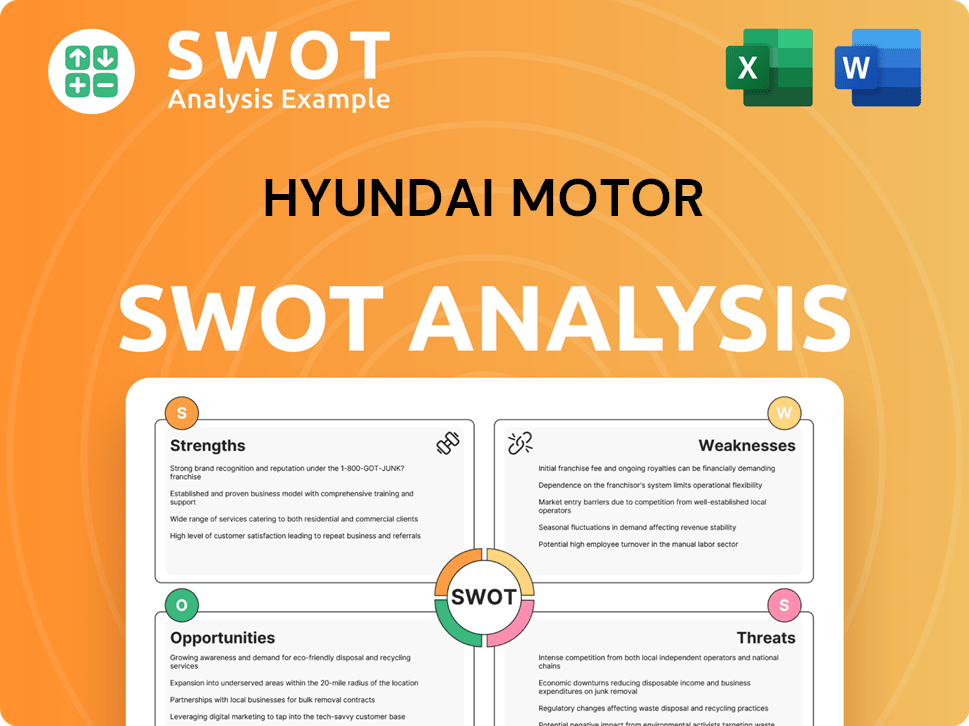
How Has Hyundai Motor’s Ownership Changed Over Time?
The ownership of Hyundai Motor Company has transformed since its inception, maintaining a strong family influence despite going public. While specific details on the initial public offering (IPO) date and initial market capitalization are not readily available in the general public domain, the shift towards public listing and institutional investor involvement has been significant. The Chung family, through various holdings and affiliates, continues to exert considerable influence. The evolution reflects a balance between family control and the need for capital and market liquidity.
As of late 2024 and early 2025, the ownership structure includes institutional investors, mutual funds, and individual insiders. The Hyundai Motor Group, led by Chairman Euisun Chung, the founder's grandson, retains overarching control. Kia Corporation, a subsidiary, also holds a substantial stake, highlighting the interconnectedness typical of South Korean conglomerates. Furthermore, the National Pension Service of Korea is a key institutional investor, holding a significant portion of shares. These changes have enabled capital infusion and market liquidity while preserving the founding family's strategic oversight.
| Stakeholder | Approximate Ownership (2024-2025) | Notes |
|---|---|---|
| Hyundai Motor Group (Chung Family) | Significant, controlling stake | Through various holdings and affiliates. |
| Kia Corporation | Significant | Subsidiary of Hyundai Motor Company. |
| Institutional Investors | Significant | Includes mutual funds and other institutional entities. |
| National Pension Service of Korea | Significant | Key institutional investor. |
Understanding the ownership structure is crucial for investors and stakeholders alike. It provides insights into the company's governance, strategic direction, and potential risks. For a deeper dive into the company's financial operations, consider exploring Revenue Streams & Business Model of Hyundai Motor.
The ownership of Hyundai Motor Company is a blend of family control and public market influence.
- The Chung family, through Hyundai Motor Group, maintains significant control.
- Institutional investors and Kia Corporation hold substantial stakes.
- The National Pension Service of Korea is a major institutional investor.
- This structure balances family oversight with capital market dynamics.
Hyundai Motor PESTLE Analysis
- Covers All 6 PESTLE Categories
- No Research Needed – Save Hours of Work
- Built by Experts, Trusted by Consultants
- Instant Download, Ready to Use
- 100% Editable, Fully Customizable
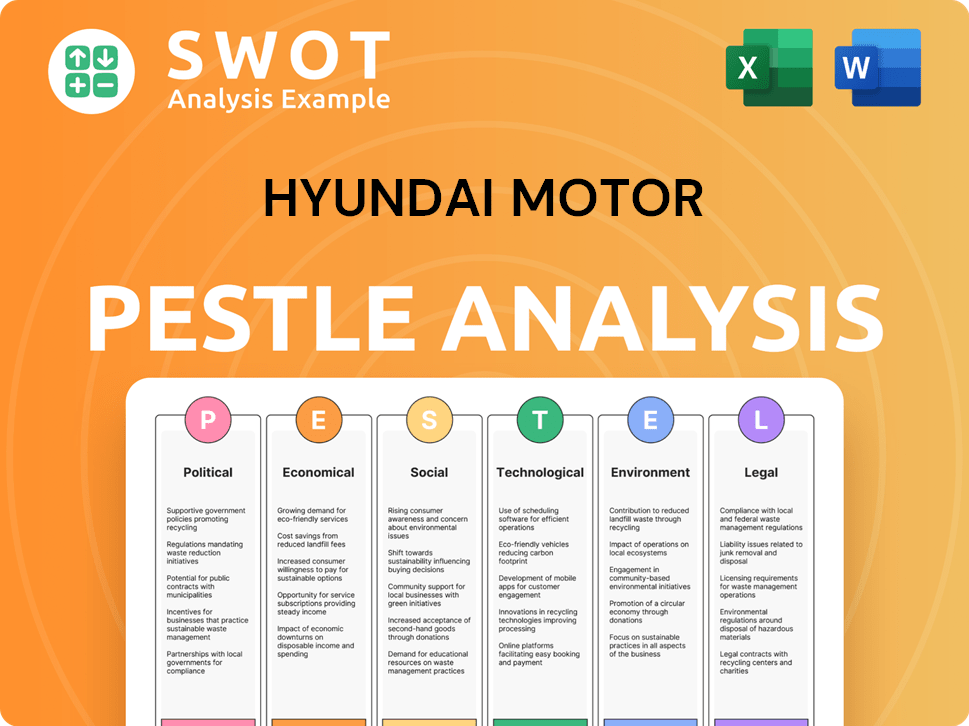
Who Sits on Hyundai Motor’s Board?
The current board of directors of Hyundai Motor Company includes a combination of representatives from major shareholders and independent members. However, the influence of the controlling family is still quite significant. The chairman of the board, Euisun Chung, directly represents the founding family's interests and holds considerable control. The exact composition of the board and the specific representation of major shareholders can change, but the core dynamics remain consistent.
The voting structure at Hyundai generally follows a one-share-one-vote principle for common shares. However, the complex cross-shareholding structure within the Hyundai Motor Group concentrates voting power within the controlling family. This setup allows the family to maintain substantial control, even without directly owning a majority of shares in every listed entity. Ongoing discussions and pressure for corporate governance reforms in South Korea aim to improve transparency and shareholder rights, potentially affecting the long-term voting power dynamics within Hyundai. For example, in 2024, there were discussions about increasing the independence of board members to enhance corporate governance.
| Board Member | Role | Notes |
|---|---|---|
| Euisun Chung | Chairman of the Board | Represents the founding family's interests. |
| Wonhee Lee | President and CEO | Oversees the company's operations. |
| Jaehoon Chang | Director | Plays a key role in strategic decisions. |
The Hyundai Motor Group's ownership structure is complex, with cross-holdings among its affiliates. This structure concentrates voting power, allowing the controlling family to maintain influence. The Growth Strategy of Hyundai Motor details how these structures influence the company's strategic direction.
The Hyundai Motor Company's ownership structure is complex, with the founding family holding significant influence.
- The chairman, Euisun Chung, represents the family's interests.
- Cross-shareholdings within the Hyundai Group consolidate voting power.
- Corporate governance reforms could affect future voting dynamics.
- Understanding the ownership structure is crucial for investors.
Hyundai Motor Business Model Canvas
- Complete 9-Block Business Model Canvas
- Effortlessly Communicate Your Business Strategy
- Investor-Ready BMC Format
- 100% Editable and Customizable
- Clear and Structured Layout
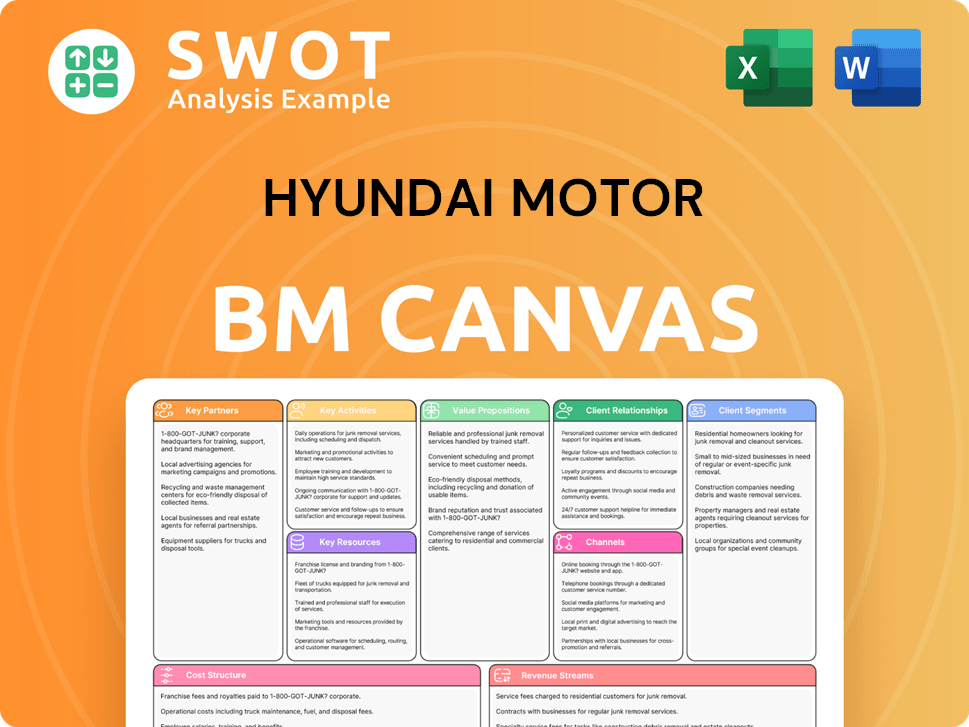
What Recent Changes Have Shaped Hyundai Motor’s Ownership Landscape?
Over the past few years, from 2022 to 2025, Hyundai Motor Company has been navigating a dynamic landscape. While the foundational ownership structure, with the Chung family at its center, remains largely unchanged, there's a continuous effort to refine corporate governance. This includes ongoing discussions about restructuring within the broader Hyundai Motor Group to streamline complex ownership ties. The goal is to address concerns from institutional investors and enhance shareholder value.
Strategic investments in future mobility technologies are a key focus. These investments could indirectly influence ownership dynamics as new partnerships and collaborations arise. Furthermore, industry trends, such as increased institutional ownership and a strong emphasis on ESG (Environmental, Social, and Governance) factors, are pushing South Korean conglomerates like Hyundai to improve their governance structures. This involves a growing focus on independent directors and more robust shareholder engagement. While significant shifts in major stakeholder ownership percentages haven't been widely publicized, these developments could gradually lead to a more dispersed ownership influence over time, even with the continued strong presence of the founding family.
Hyundai is focused on streamlining corporate governance and responding to market trends. The company is addressing concerns from institutional investors. Strategic investments are being made in future mobility technologies.
The Chung family remains at the core of Hyundai's ownership. Discussions continue about restructuring within the Hyundai Motor Group. Increased institutional ownership and ESG factors are influencing governance changes.
Hyundai Motor Porter's Five Forces Analysis
- Covers All 5 Competitive Forces in Detail
- Structured for Consultants, Students, and Founders
- 100% Editable in Microsoft Word & Excel
- Instant Digital Download – Use Immediately
- Compatible with Mac & PC – Fully Unlocked
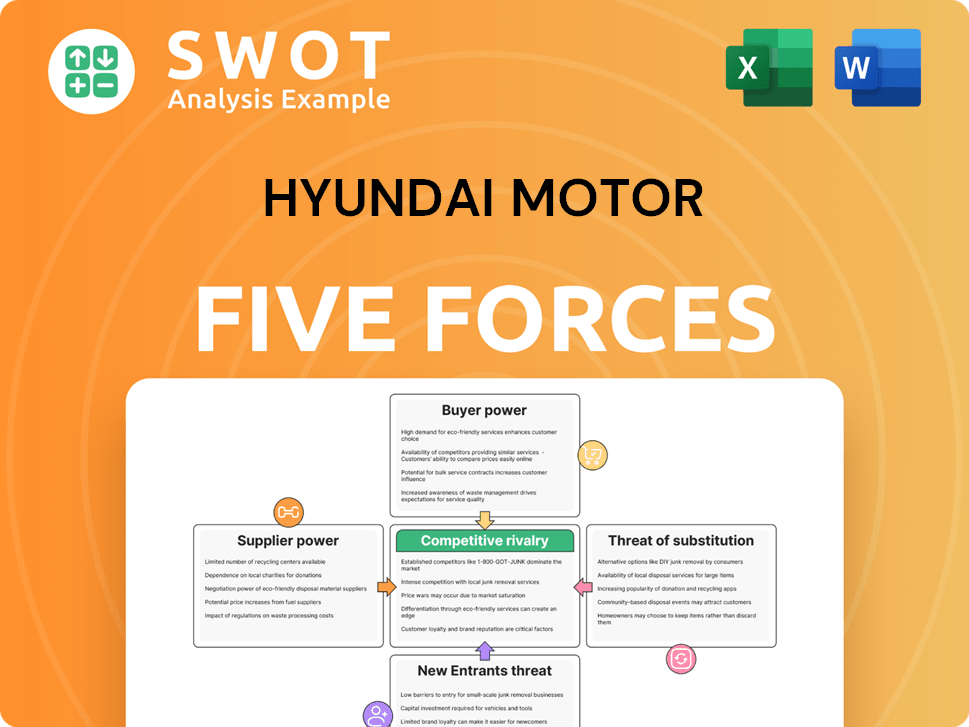
Related Blogs
- What are Mission Vision & Core Values of Hyundai Motor Company?
- What is Competitive Landscape of Hyundai Motor Company?
- What is Growth Strategy and Future Prospects of Hyundai Motor Company?
- How Does Hyundai Motor Company Work?
- What is Sales and Marketing Strategy of Hyundai Motor Company?
- What is Brief History of Hyundai Motor Company?
- What is Customer Demographics and Target Market of Hyundai Motor Company?
Disclaimer
All information, articles, and product details provided on this website are for general informational and educational purposes only. We do not claim any ownership over, nor do we intend to infringe upon, any trademarks, copyrights, logos, brand names, or other intellectual property mentioned or depicted on this site. Such intellectual property remains the property of its respective owners, and any references here are made solely for identification or informational purposes, without implying any affiliation, endorsement, or partnership.
We make no representations or warranties, express or implied, regarding the accuracy, completeness, or suitability of any content or products presented. Nothing on this website should be construed as legal, tax, investment, financial, medical, or other professional advice. In addition, no part of this site—including articles or product references—constitutes a solicitation, recommendation, endorsement, advertisement, or offer to buy or sell any securities, franchises, or other financial instruments, particularly in jurisdictions where such activity would be unlawful.
All content is of a general nature and may not address the specific circumstances of any individual or entity. It is not a substitute for professional advice or services. Any actions you take based on the information provided here are strictly at your own risk. You accept full responsibility for any decisions or outcomes arising from your use of this website and agree to release us from any liability in connection with your use of, or reliance upon, the content or products found herein.